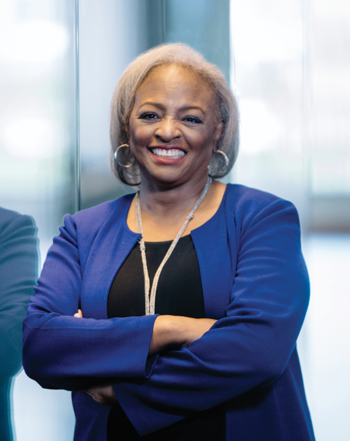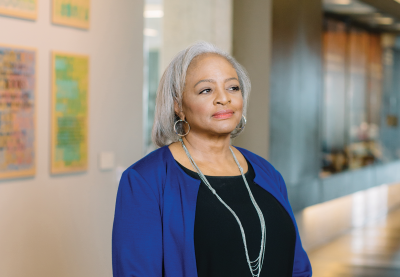Carol Anderson is a professor of African American Studies at Emory University, where she researches, teaches and writes about race and civil rights in the United States. Her newest book, One Person, No Vote: How Voter Suppression Is Destroying Our Democracy, tells a modern story about who has voting rights, who can access their voting rights—and who makes those decisions.
The title of your newest book is One Person, No Vote. Why did you choose this title? And what do you hope it will evoke in your readers?
We live in a nation where we have these kinds of sound bites, and we think we understand how this nation works. “We hold these truths.” “This is a nation of immigrants.” “One person, one vote.” But the way that voter suppression works is that it absolutely undermines that basic notion of “one person, one vote,” and it becomes “one person, no vote.” I wanted to hit the familiar but also to hit that discord that’s in there so that we can begin to understand what the attack on democracy looks like.
Voter suppression has always disproportionately affected people of color. How does institutional racism manifest itself in the current systems surrounding voting and elections in the United States?
The civil rights movement dealt with institutional violence and institutional racism that African Americans faced on a daily basis, from utero to coffin. Not even from cradle: utero to coffin. That kind of systemic, institutional racism. And one of the tricks that was deployed was to say, “Well, the signs [enforcing segregation] have come down, and now these black people have a Civil Rights Act, and they’ve got a Voting Rights Act. And so if anything is really not happening, it’s on them. It’s because they don’t have initiative. It’s because they’re lazy. It is because they don’t want to work hard.”
I talked about, in the first chapter in One Person, No Vote, how—[in] the Mississippi Plan of 1890—they knew that they had to deal with this thing called the 15th Amendment that said, “the right to vote shall not be abridged on account of race, color or previous servitude.” So Mississippi’s looking at this going, “But we don’t want black people to vote.” So what they did was, they took the societally imposed characteristics of a group of people and then made those societally imposed characteristics the litmus test—the ticket to the ballot.
You don’t fund education, and then you require folks to read chunks of the Constitution. We don’t have public transportation because we have refused to invest in public transportation. We shut down polling places. We require IDs and only specific types of IDs.
[My previous book] White Rage dealt with the myths of black pathology because this nation needs the narrative of black pathology in order to justify a series of policies. But what we don’t get is the inverse of that. ... The narrative that we get is, “How racist can America be? We elected a black man—twice.” And it is kind of self-congratulatory because the we—“We elected a black man twice”—that we means whites. It doesn’t mean everybody else. [But] the majority of whites did not vote for Obama.
So there are times when I’m giving my talk on White Rage and I get the question, “What are we to do?” And I say, “These are conversations that whites must have with whites because the work that needs to be done ... is in the white community. Black folks can provide you some of the tools, but you’ve got to do that heavy lifting.”
You write, “The reason the Voting Rights Act worked was the advent of vigorous federal intervention, not because the racism that required the law in the first place had stopped.” Can we stop racism, in your opinion, without enforcement? What other options do we have?

Enforcement. So, between 1982 and the 2006 reauthorization of the Voting Rights Act, it came out that the Department of Justice had blocked over 700 proposed changes to voting laws by the jurisdictions—those states that were under the pre-clearance provision of the Voting Rights Act. And the DOJ blocked [the proposed changes] because they were racially discriminatory. ...
...During radical Reconstruction, federal troops are really there [enforcing voting rights] and they know they got to handle business. And we saw that with the rise of black registration, black voter turnout and black elected officials. With the Compromise of 1877, when federal troops are removed from the South, and Rutherford B. Hayes is like, “Yo, you’re on your own. Peace,” you start seeing this thing begin to move and shift until we get to massive disfranchisement in 1890, and there was no enforcement. None. And the impact of that was by the time—I think it was 1940—only 3 percent of African Americans were registered to vote in the South.
What is missing in the ways we teach and talk about voting in our country, and what are the best ways to learn about voter suppression?
In K–12, you get kind of an arc that the Founding Fathers crafted this beautiful Constitution, and you can almost hear the harps playing in the background. And then, you get a sense that, “Oh, but something didn’t go quite right, so we had to have a little Civil War. Because there was this thing called slavery. And Lincoln freed the slaves.” And then we get ... “Go west, young man! From sea to shining sea!”
Struggle is missing. Racism is missing. The battle for citizenship is missing. The steps forward and the steps back, the kinds of racialized opposition to full enfranchisement, the gendered opposition to full enfranchisement. All of that is missing in that arc.
We don’t educate about voting. North Carolina, which had been a very progressive government, had high school voter registration. When students were taking their civics class, they were being registered to vote as well. So they got a sense that voting was part of your civic engagement; it was your right as a citizen. When the Republicans came to power in 2010, not only did they close early voting sites and reduce early voting hours and require certain types of voter ID, but they stopped registration in high schools. So voting and registering becomes a task that you do instead of part of your identity. ... And so they don’t have a voice—a political voice—and they don’t have an economic voice.
You write in the book, “It can never be forgotten that the state that produced the Eugene ‘Bull’ Connors, the Sheriff Jim Clarks and Judge Roy Moores also created the civil rights warriors who took down and defeated Bull and Jim and now had Roy in their crosshairs.” Talk about the people and organizations working to protect the right to vote. What can we learn from them?
We saw our power. Folks knew that work needed to be done, and the state wasn’t going to do it. They knew what was at stake. So, watching the NAACP [get] the list of the voters that hadn’t voted in 2016 (or voting intermittently) and get all of their members [to] start calling. Just talking—Alabamian to Alabamian—then following up, knocking on doors, continuing the conversation.
The narrative is, ‘How racist can America be? We elected a black man—twice.’ But the majority of whites did not vote for Obama.
Alabama had shut down 66 polling stations. ... The NAACP and another organization set up a private car system like they did in the [1955] Montgomery bus boycott so that people could get to and from the polls. There were information sessions ... just letting people know: When do you register to vote? Where do you register to vote? How do you register to vote? Those sorts of things. Providing information, figuring out: What are the barriers that the state has created to block people from voting? What resources can each of these organizations bring to bear on either removing those barriers, getting folks over those barriers, around those barriers or through those barriers?
Is there anything else you want readers to know?
Race may be a social construction, but it is real. And we need not to fall into that trap of acting like that social construction does not have a major effect on the quality of your life. And to also understand that the language of racial divisiveness is a tool. The ploy of racial divisiveness is real because what that does—we’ve got a long history of this—is that it keeps us from finding our power. It keeps us from finding our joy. And it keeps us from experiencing our own greatness.
Brown is a professional development trainer and Malley is the editorial assistant for Teaching Tolerance. This interview has been edited for length and clarity.

